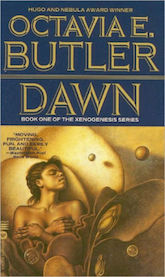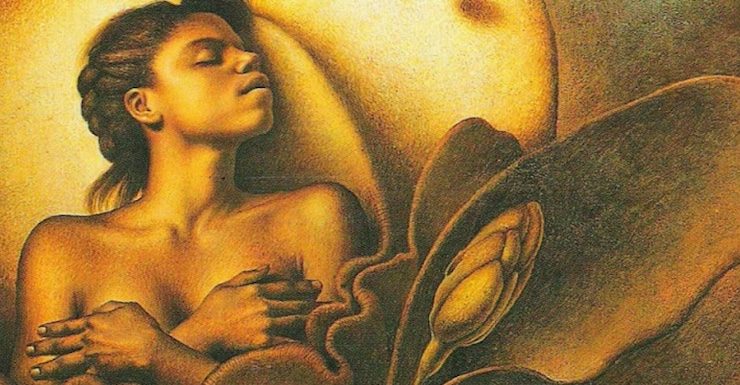I first found Dawn, about fifteen years ago, in my local library. I hadn’t heard of Octavia Butler. I’m not sure why I picked Dawn up. It was probably the post-apocalyptic blurb; I’ve always been drawn to stories about the end of humanity as we know it. I hadn’t yet realised that what I liked about those stories was often the fact that they are really about beginnings, too.
Dawn is absolutely about a beginning, and how painful that can be. Butler makes hundreds of brave choices throughout the book that still stagger me, and defy traditional writing advice. That’s obvious from that first section alone, Womb, with its introduction to Lilith Iyapo, one of the few survivors of a terrible war on Earth, saved and also kidnapped and drugged by an alien race called the Oankali.
Womb starts with the awakening of Lilith in a plain white chamber. Tests have been performed upon her, including some sort of surgery that has left a scar across her abdomen, but no explanation has ever been given to her. We’re meeting Lilith as a captive, so we’re not getting to know what she was like before that experience, and that’s a big risk that only pays off because Butler is such a strong creator of character. While describing Lilith in this environment, she manages to give us a sense of a person in continuation. Lilith has experienced many things, and that influences her decisions. She’s already a survivor, on many levels. Therefore she explores the room in which she’s being kept, and she attempts to make sense of it. She carries out tests herself, upon her surroundings. The fear Lilith feels is not the focus of the writing, although it’s absolutely present. The emphasis is on her desire to understand, and once that’s established, it allows us to see the Oankali in a different light. They are not immediately monsters because we are looking for clues as to why they’ve treated Lilith in this way. We want answers more than we want to pursue an emotional response.
Buy the Book


Dawn (Xenogenesis, Bk. 1)
The Oankali are then introduced in a long sequence of intense dialogue, where Lilith battles her own physical reactions while talking to an alien who is happy to provide only certain amounts of information. It’s a conversation that throws out some amazing ideas to do with genetics, sexuality, survival and morality. The alien tries to keep still throughout so that Lilith can adjust to its presence, which revolts her, and this juxtaposition of visceral reaction to intellectual engagement in a vacuum of action is one of the most powerful reading experiences I’ve ever had, and certainly something I’ve tried to capture in my own writing sometimes. It doesn’t simplify anything for the reader, and it doesn’t lose any aspect of being human. Lilith’s body reacts to the creature in one way, and her mind in another way, and yet she is still absolutely a strong, cohesive character.
All of this is achieved using very accessible language. Butler proves that far-reaching concepts and hugely layered experiences can be conveyed, together, to produce an intense, engrossing read that defies the usual approach to writing about first contact scenarios. The sense of otherness that Lilith struggles to accept is not based in an inability to communicate clearly with the alien, or to make sense of its wants and desires. It flows from that deep-down repulsion she feels to its tentacle-like sensory organs, and it simply refuses to accept her response to it. It demands that she looks at it, and engages with it, in an attempt to forge a relationship that gets past her initial reactions.
I found myself to be unsure of many things when I reached the end of the first section of Dawn. There wasn’t a comfortable place to stand in relation to the Oankali. They held people against their will and performed surgeries upon them, but they could argue this was for good reason; the surgery was often life-saving, such as removing a cancerous growth in Lilith’s case. They forced humans into stressful situations and unwanted contact, but they did this in the name of species survival. There are no straightforward answers for Lilith, or us. She will be forced to make very difficult decisions where no choice could be said to be the correct one.
After I read Dawn, I thought about it a lot. I asked my library to track down the other two books in the Xenogenesis trilogy for me (this was before I could order them myself online) and for some reason they never did manage to find them, so the consequences of Lilith’s decisions for humanity and for the Oankali was not something I discovered until much later. This gave the book an added power, I think. It was a frozen moment. I borrowed the book many times, trying to work out how Butler made it work; it was so different from anything else I had read. It asked such amazing questions without ever losing my interest.
When I came to write The Beauty, Butler’s work was very much in my mind because I wanted to raise the kind of questions she had. The first time my narrator, Nathan, meets the strange creatures that have grown on the graves of the dead women of his community, the Womb section was my guide. I tried to use the same techniques Butler used to heighten the strangeness, yet reveal the possibility of acceptance without sacrificing otherness.
There’s a wonderful moment early on in Womb when the Oankali that Lilith first meets brings her a gift—a banana. It’s the perfect object in that setting, because Butler can describe Lilith’s delight in it lovingly, bringing colour and depth to the scene. It’s not an uncomplicated gift. It suggests that the aliens care for Lilith’s needs and understand her humanity, but that comes with an uncomfortable undercurrent. They know how to please her. They have been observing her. But still, who can resist such ripe fruit?
When, in The Beauty, Nathan is first kidnapped and held, his captors bring him a similar gift: apples, and a honeycomb. They are given in recognition of human needs and wants, recognising the sweetness of Earth’s fruit. This also reminds us that he knows nothing about the creatures that are holding him, and what their own wants and needs might entail. That symbolic gift in The Beauty is a result of my long admiration of Octavia Butler’s Dawn. Everything has more than one meaning, and there are so many ways to make a beginning work.
 Aliya Whiteley writes novels, short stories and non-fiction and has been published in The Guardian, Interzone, Black Static, Strange Horizons, and anthologies such as Fox Spirit’s European Monsters. She has been nominated for the Pushcart Prize twice, and won the Drabblecast People’s Choice Award in 2007. Her novel The Beauty is now available from Titan Books.
Aliya Whiteley writes novels, short stories and non-fiction and has been published in The Guardian, Interzone, Black Static, Strange Horizons, and anthologies such as Fox Spirit’s European Monsters. She has been nominated for the Pushcart Prize twice, and won the Drabblecast People’s Choice Award in 2007. Her novel The Beauty is now available from Titan Books.










